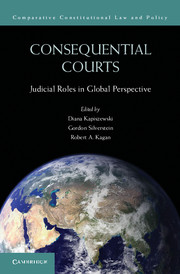Conclusion - Of Judicial Ships and Winds of Change
Published online by Cambridge University Press: 05 April 2013
Summary
Changes in Judicial Roles: The Elusiveness of Simple Explanatory Models
In his chapter in this volume, Martin Shapiro observes that “‘The mighty problem’ of constitutional judicial review” raises a major empirical challenge: “when, where, and why do the powers that be…allow a handful of judges without purse or sword to get away with making major policy decisions?” (Ch. 16 in this volume, p. 380). In recent decades, the salience of these questions has increased. More political regimes have established constitutional courts. More courts have overruled legislation and executive orders. Thus, more judges have played important roles in politics, policy, and governance. However, in some countries, courts have been cautious about engaging in judicial review or, when they have done so, have been politically attacked and driven to retreat. In other regimes, political authorities have preempted or limited the exercise of judicial review, preventing an expansion of judicial roles in governance.
Faced with this variation, scholars interested in the political roots of judicial power have focused on three related aspects of Shapiro's when, where, and why questions. Under what conditions are courts granted (or do they themselves adopt) judicial review powers and significant remedial authority? Under what conditions do courts exercise those powers assertively? Under what conditions can courts exercise those powers both assertively and successfully (i.e., achieving compliance with their rulings)?
- Type
- Chapter
- Information
- Consequential CourtsJudicial Roles in Global Perspective, pp. 398 - 412Publisher: Cambridge University PressPrint publication year: 2013
References
- 2
- Cited by



